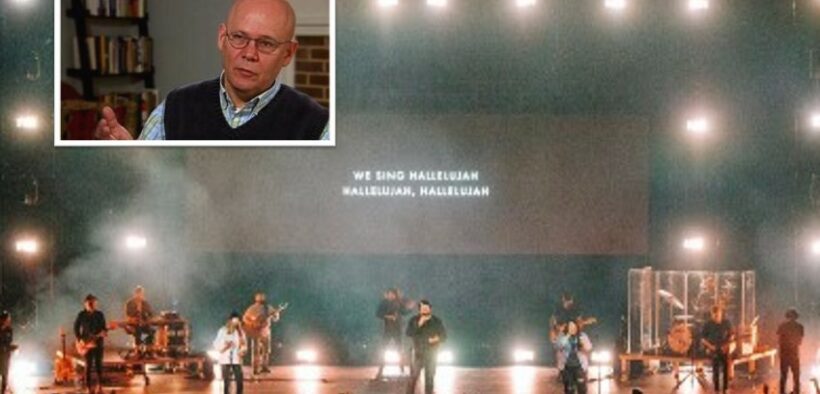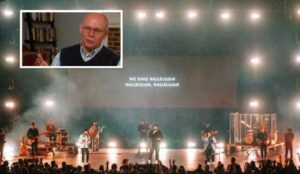EDITOR’S NOTEBOOK: “Stick To The Old Paths”
Church Music Is About More Than Style

OPINION–When your church sings a song in its Sunday service, it’s an act of worship. 
But for most churches it is also an act of commerce. Someone is getting paid, probably lots of someones. Let me explain.
Most churches make payments to an organization called CCLI – Christian Copyright Licensing International. Those payments to CCLI give the church the right to use copyrighted material in their Sunday services. CCLI then distributes that money to the copyright holders, usually songwriters but sometimes big publishing companies. And, of course, CCLI keeps a portion for itself.
This is a perfectly legal arrangement. Songwriters should get paid for their work, and CCLI provides a valuable service for all concerned.
But even good systems can be abused, or have unintended consequences.
For the past decade, a handful of megachurches have dominated worship music. They include Elevation Church, Australia-based Hillsong, and California’s Bethel Church – all churches that have had their share of scandal and controversy.
Still, most worship leaders have carefully compartmentalized the controversy, and have continued to use their songs – and, in effect, financially support these churches.
A couple of new studies we reported on this week at MinistryWatch help us see this issue more clearly. One of the studies, released Tuesday, July 11, found that most worship leaders continue to use songs from Hillsong and Bethel, two of megachurches that dominate modern worship music.
The study also found that worship leaders use a narrow theological lens to decide whether to sing a song or not. Songs get used not because they are theologically sound, or because a pastor or denominational leader wants to use the song to teach or reinforce a sermon point or a theological doctrine. Instead, songs are chosen because they are heavily promoted to worship leaders through conferences or social media.
Access to MinistryWatch content is free. However, we hope you will support our work with your prayers and financial gifts. To make a donation, click here.
Elias Dummer, a Christian musician turned marketer who is part of the research team behind the study, said most worship leaders think they have good reasons for picking the songs they use in worship. But they may not be aware of how social forces — like the popularity of certain churches and the strength of their marketing — affect their choices.
Only 16 percent of worship leaders said they were less likely to choose a song with ties to Hillsong, while about 1 in 4 said they were less likely to choose songs with ties to Bethel (27 percent).
Researchers also found that recommendations from friends on social media made it more likely that worship leaders would choose a song. Hearing a song at a live event (76 percent) or streaming online (70 percent) also made it more likely they’d choose a song.
To make matters worse, or at least more interesting, Will Bishop, associate professor of church music and worship at Southern Baptist Theological Seminary in Louisville, Kentucky, has done research that adds to the case that church music has become disconnected from a discipleship or faith formation process.
Among the findings: worship leaders pick most of the music, often with no input from the church’s pastor. Two-thirds of churches (65 percent) said they never use hymnals.
Bishop’s survey also found some surprising results. He’d heard that some churches play secular songs in services and decided to ask if that was the case. He learned that SBC churches played songs like Carole King’s “You’ve Got a Friend” and Bill Withers’ “Lean on Me.” Among the weirder results: “The Lion Sleeps Tonight” and “Take Me Home, Country Roads.” (By the way, I love these songs, but in a worship service? Really?)
I have no doubt that many people will not be troubled by these findings. They might shrug and say “so what?”
But that response dismisses the fact that music is a powerful teacher. It is important to our faith-formation and discipleship process. The songs we sing in church should be chosen carefully, and in the current environment, they are not. These studies strongly suggest that they are chosen based on the forces of the marketplace.
The Greek philosopher and musicologist Damon of Athens once said, “Give me the songs of a people and I care not who writes the laws.” He understood the power of the songs we sing.
I would respectfully revise Damon’s famous phrase: “Give me the songs of a church, and I care not who writes its doctrinal statement.”
I do not mean to suggest that only old songs are good songs. I thank God that many great worship songs are being written today. I think immediately of Andrew Peterson’s “Is He Worthy?” or Keith Getty’s “In Christ Alone” as songs that, though new, have become instant classics.
But such songs, though notable, are rare. It usually takes time to know if a song, or a book, or a piece of art is relevant not just for its time, but for all time. C.S. Lewis was right when he recommended, in his introduction to Athanasius’ On the Incarnation, to read old books. The Bible says it this way: “Stick to the old paths.” (Jer. 6:16)
I realize that these ideas will strike some as quaint, or old-fashioned, or even curmudgeonly. But I don’t think they are. We are seeing a resurgence in “ancient future” practices in the church, practices that include recitations of the creeds, corporate confession of sin, weekly Eucharist, and more. I now hear regularly from my young Christian friends that they have tried and rejected “emergent” and “progressive” theologians in favor of Aquinas and Augustine, Bavinck and Luther.
The humorist P.J. O’Rourke once said, “Thinking outside the box is overrated. The best ideas are in the box. We put them there so we wouldn’t lose them.”
That’s advice the church should remember when it faces the temptation to reach for the next shiny new thing.



